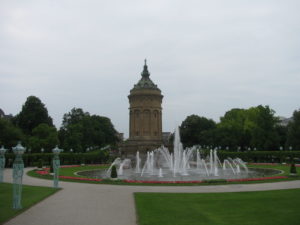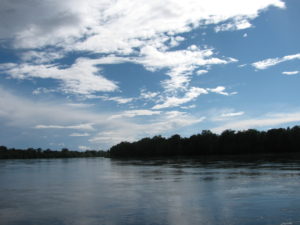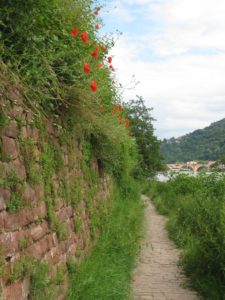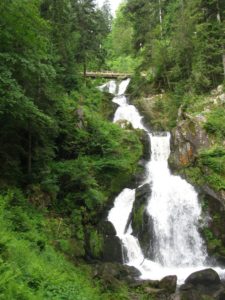Today I completed my second week of classes at the Goethe Institut in Mannheim, which means I’m already a quarter of the way through my studies here. It’s been a full two weeks: my classes run from 8:30 AM to 1 PM Monday through Friday, and when I’m not in class I’ve been exploring the city and adjusting to life in a new place. My studies at the Goethe Institut have helped to solidify the German I’ve already learned while continuing to push me forward, especially when it comes to speaking. Goethe Institut has several great locations throughout Germany, but I am glad that I choose to come to Mannheim, a mid-sized city where I’ve already made a few wonderful discoveries.
The Goethe Institut was founded in 1951 with the purpose of providing additional training for foreign teachers of German in Germany. Today it serves as the Federal Republic of Germany’s cultural institute, teaching German language and serving as an ambassador for German culture broadly defined. Goethe Institut’s global reach can be easily deduced from my class’s international composition: my fellow students are from Hong Kong, Saudi Arabia, Turkey, Ireland, Tunisia, Vietnam, and the United States. Our classes are structured around activities and interpersonal interaction (carried out completely in German, of course), so we’re consistently required to mingle with each other. This approach has been very helpful for my own particular learning. I started studying German this year in a graduate reading course that focused exclusively on translation into English. It was fast-paced, and I learned enough to competently translate German given enough time and a dictionary, but my knowledge was more broad than deep, and I could essentially only read. The intensive classes here at Goethe Institut have allowed me to develop a better grasp of some of the grammar I learned so quickly before, and the focus on interpersonal interaction has helped bring my conversational skills up to speed.
The grammatical area I’ve sensed the most improvement in so far has been the German case system, which I think is a significant challenge for English speakers. Whereas in English there is only one definite article, “the,” in German there are five, “der,” “die,” “das,” “den,” and “dem,” and they can signify sixteen different kinds of noun depending on gender, number, and case. That’s a paradigm shift! When I was learning to translate I had to have familiarity with the case system, but I could get away with a little guesswork: all I needed to do was translate German definite article into “the.” Being required to speak German has forced me to get closer to the case system, and to develop a more precise understanding of how the language is working. Overall, even though I’m still a beginner when it comes to speaking German, I’ve taken significant steps beyond the Goethe Institut placement interview I had to do upon my arrival. Then I could barely string a sentence together to say what I needed to say, and now I do this kind of thing on a daily basis in class.
Of course, speaking in class is different that speaking on the streets, but I’ve been doing some of this too. Mannheim’s streets, in fact, are quite distinctive. Much like Philadelphia, and built around the same time, Mannheim’s city center is laid out as a chessboard-like grid, a testament to the Enlightenment’s rage for order. Unlike Philadelphia, however, you won’t find a Chestnut or an Arch street here, not even a Goethe Straße: the grid is organized by letters and numbers, so blocks are referred to as “A4” or “K7.” This layout has garnered Mannhiem the nickname “die Quadratestadt”—city of squares. While this may seem a bit impersonal, Mannheim’s city center contains a number of public spaces and historic buildings, and is largely pedestrianized, so walking the city makes for a nice break from study. I suppose the Enlightenment was never as orderly as it hoped to be, and that here, there, and everywhere, it sometimes is hip to be square.
While Mannheim’s most famous sight is the Wasserturm, my favorite thing to go to downtown is Wochenmarkt, the weekly farmer’s market held in in the Marktplatz. Here I can take in the wide array of fruit, vegetables, breads, cheeses, and, of course, Wurst, that the vendors bring in from the area. Last week I approached one of the stands selling Wurst and asked for help selecting from the many kinds of sausage that were being sold. The vendor very patiently helped me, teaching me the names of the various sausages and giving me a summary of how spicy they were. I took several home and enjoyed them very much. Yet even outings like this on the city grid practicing my German can feel taxing at the end of the day. I’m learning how much energy it takes to make one’s way around a foreign place using a foreign language. For this reason I’ve been thankful to discover recently, completely by accident, that my apartment is a five minute walk from a heavily forested park that borders the Rhine river. At the end of the day being able to go here and stroll along the bank, passing other people by and not having to say a word, is a welcome respite.

Mannheim’s Water Tower

The Rhine












